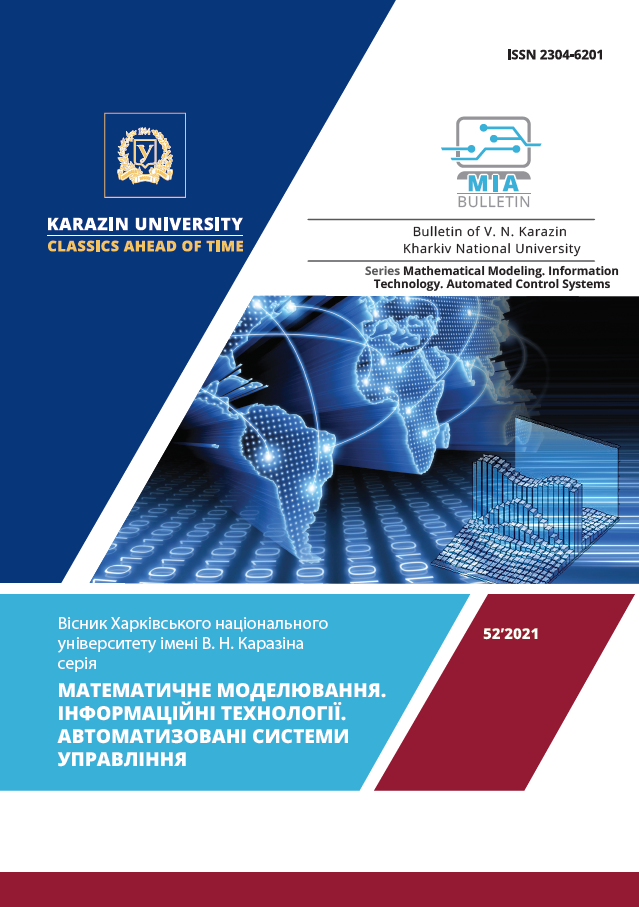Research of the computer model of the web service for testing knowledge
Abstract
Testing is widely used as one of the methods of monitoring students' assimilation of knowledge and has a number of certain advantages over traditional methods of assessment. At schools and universities, tests can be used for monitoring and evaluate students' behavior, psyche, career guidance, or motivation. For a long time, paper tests have been used by educational institutions and private companies to assess student or employee performance. State exams and contests often include a multiple-choice test. Conducting such tests requires preparing a location for the test, spending time on checking and notifying students. Currently, there are a large number of different ways to monitor and evaluate knowledge. A tool for measuring a student's achievements is a properly designed test that corresponds not only to the subject of study, but also to its tasks and serves to develop a systematic approach to studying the discipline. Testing in educational institutions is used as a means of objective control of students' knowledge of the curriculum. Systematic monitoring of students' level of knowledge, on the one hand, determines the student's academic performance, and on the other hand, it is an indicator of the effectiveness of teaching methods and organization of the educational process. The inclusion of various forms of test tasks in the learning process motivates students to step up work on mastering educational material and forms a desire to develop their abilities. Comparing the testing performed with the help of paper questionnaires and online testing, it is obvious that online testing is much more effective.
The computer models of web-based knowledge verification services have been investigated in this paper by using methods of statistical and computer modeling. The research of knowledge control methods has been carried out and it has been shown that the time required to create a test and analyze the results in the perspective system could be minimized by using the modern technologies in the field of web development. The choice of the system architecture and a specific set of technologies depends on the requirement of maximizing speed of the system-user interaction. The analytical component of the system should answer the users’ most popular questions concerning the test results. The results obtained provide the main characteristics for creating a computer model of a web service for testing knowledge.
Downloads
References
/References
Kovalev V. M. modern methodologies for describing business processes. IDEF0 methodology: director's consultant Journal, No. 12, June, 2004 [in Russian] https://buscreative.blogspot.com/2015/11/blog-post_14.html
Lomovtseva N. V. control of educational activity in distance learning. [in Russian] https://cyberleninka.ru/article/n/kontrol-uchebnoy-deyatelnosti-v-distantsionnom-obuchenii
Polat E. S. Teoriya I Praktika distance learning: Uchebnoe posobie dlya stud. Polat E. S., Bukharkina M. Yu., Moiseeva M. V. higher pedagogical educational institutions. Moscow, Akademiya publ., 2004, 416 p. [in Russian] https://www.academia-moscow.ru/ftp_share/_books/fragments/fragment_20163.pdf
Gavrilova L. A. Distance Education. E-Courses: a training manual for teachers. Yekaterinburg: UGSU publ., 2006, 74 p. [in Russian] https://textarchive.ru/c-2930313-pall.html
Kanaev V. I. distance learning: technological aspects. Moscow: Sovremennoe Humanities University, 2004, 192 p. [in Russian] https://rusist.info/book/539320
Razzakov sh. I., Narziev U. Z., Rakhimov R. B. Kontrol of knowledge in the distance learning system. - Text: direct / / Young Scientist. -– 2014.- № 7 (66). – P.70-73. [in Russian] https://moluch.ru/archive/66/10934/
Ковальов В. М. Сучасні методології опису бізнес-процесів. Методологія IDEF0: Журнал" Консультант директора", № 12, Червень, 2004 р. https://buscreative.blogspot.com/2015/11/blog-post_14.html
Ломовцева Н. В. Контроль навчальної діяльності в дистанційному навчанні. https://cyberleninka.ru/article/n/kontrol-uchebnoy-deyatelnosti-v-distantsionnom-obuchenii
Полат Є. С. Теорія і практика дистанційного навчання: Навчальний посібник для студ. вищ. пед. навч. закладів / Є. С. Полат, М. Ю. Бухаркина, М. В. Моїсеєва. - М. « "Академія", 2004.- 416 с. https://www.academia-moscow.ru/ftp_share/_books/fragments/fragment_20163.pdf
Гаврилова Л. А. Дистанційна освіта. Електронні курси: Навчально-методичний посібник для викладачів. - Єкатеринбург: УГГУ, 2006. - 74 с. https://textarchive.ru/c-2930313-pall.html
Канаєв В. І. Дистанційне навчання: технологічні аспекти. - М.: Сучасний гуманітарний університет, 2004. - 192 с. https://rusist.info/book/539320
Раззаков, Ш. І. Контроль знань в системі дистанційного навчання / Ш. І. Раззаков, У. З. Нарзієв, Р. Б. Рахімов. - Текст: безпосередній / / Молодий вчений. – 2014. – № 7 (66). - С. 70-73. https://moluch.ru/archive/66/10934/




